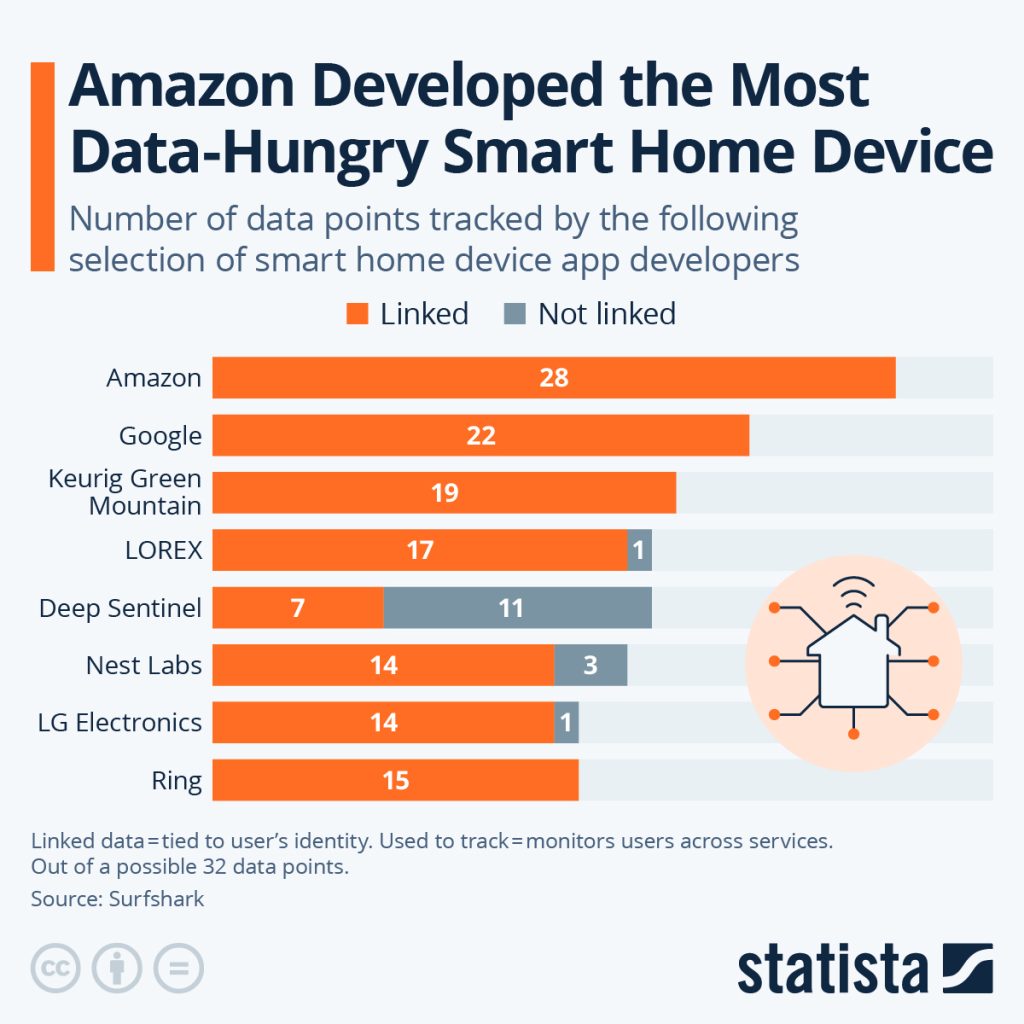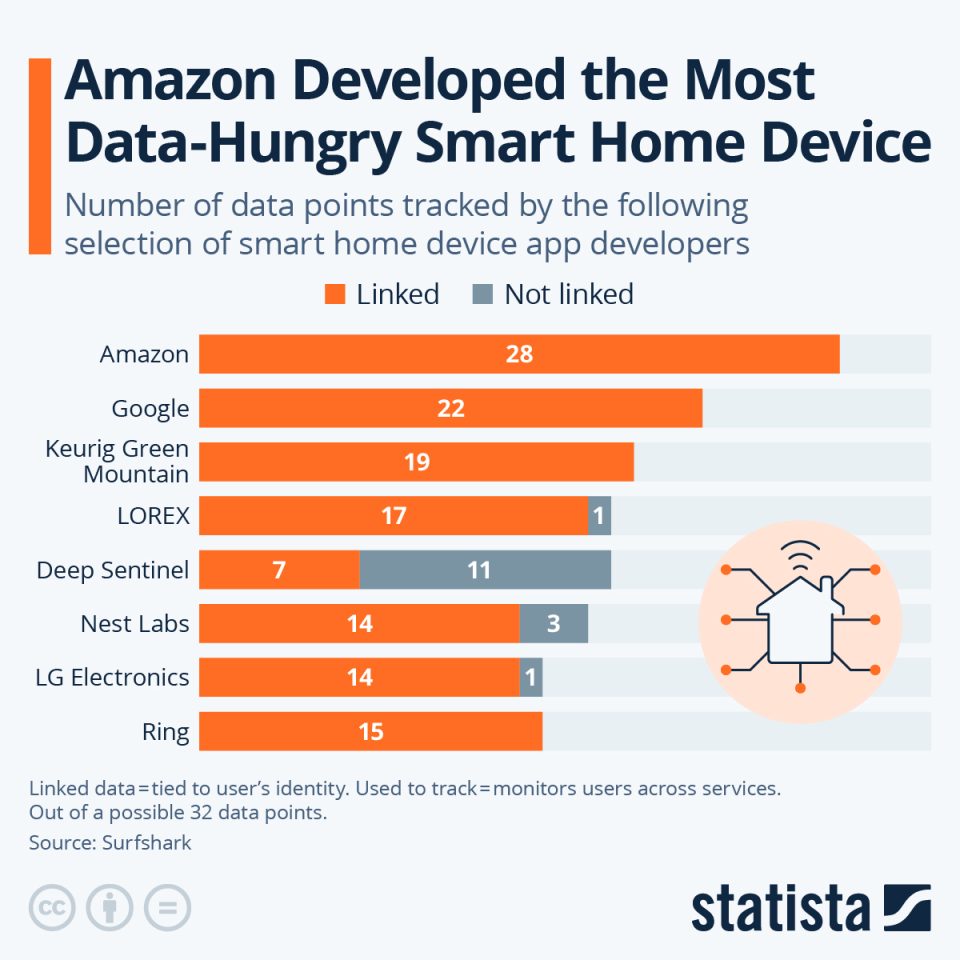How Data Privacy and Data Tracking Shapes Smart Home Customer Experience
Smart home devices promise convenience, efficiency, and security. However, they also raise concerns about data privacy. Companies collect and track data to enhance customer experiences. At the same time, users worry about how much data these devices gather. A recent report by Surfshark, visualized by Statista, highlights the most data-hungry smart home device developers. The findings reveal a crucial aspect of customer experience (CX): data transparency and user trust.
Understanding Data Tracking in Smart Homes
Smart home devices connect to the internet to function optimally. They learn user preferences, automate tasks, and improve interactions. However, their ability to collect data varies. According to the study, Amazon tops the list with 28 tracked data points. Google follows with 22. Other companies, such as Keurig Green Mountain, LOREX, and Ring, also track substantial amounts of data. Although these data points improve personalization, they also raise privacy concerns.
The collected data falls into two categories: linked and not linked. Linked data ties directly to user identity. This type of data enables seamless cross-device interactions. However, it also means that companies can track individual behaviors. On the other hand, not-linked data does not directly identify users. Deep Sentinel, for example, collects 11 not-linked data points but only 7 linked ones. While this approach provides some anonymity, it does not eliminate all risks.
Balancing Personalization and Privacy
Customers expect smart home devices to simplify their lives. They enjoy features like voice-activated controls, automated schedules, and security alerts. Yet, they also value privacy. Companies must strike a balance between personalization and data security. Amazon, for instance, gathers the most data. Consequently, its devices offer extensive personalization. However, users may hesitate to adopt these devices if they feel over-monitored.
Google follows a similar pattern. It collects 22 data points, enhancing services like Google Home and Nest. While these integrations provide convenience, they also require extensive tracking. Keurig Green Mountain, a brand known for coffee machines, surprisingly collects 19 data points. This finding suggests that even non-traditional smart devices gather significant information.
Customer Trust and Transparency
Trust plays a critical role in customer experience. Users want to know what data companies collect and how they use it. Transparency fosters confidence. Without it, customers may switch to brands that prioritize privacy. Companies like Deep Sentinel and Nest Labs demonstrate a more balanced approach. They collect fewer linked data points, reducing privacy concerns.
Moreover, data breaches and misuse can damage brand reputation. If customers feel their data is at risk, they may disable features or stop using devices altogether. Companies must address these concerns proactively. Providing clear privacy policies, offering opt-out options, and securing data help maintain trust.
Company Ratings: Data Privacy & Policy Analysis
To better evaluate these companies, we assign ratings based on data privacy, policy clarity, risks, and management.
- Amazon – 2/5
- Tracks the most data (28 points)
- Extensive personalization but high privacy risks
- Users have limited control over data usage
- Transparency improvements needed
- Google – 3/5
- Collects 22 data points
- Clearer policies than Amazon but still high tracking
- Offers some privacy customization options
- Keurig Green Mountain – 2.5/5
- Surprisingly high data collection (19 points)
- Unclear reasons for extensive tracking in a coffee machine
- Needs better transparency and opt-out features
- LOREX – 3.5/5
- Collects 17 linked, 1 not-linked data point
- Primarily security-focused devices with justified tracking
- Decent data protection but room for improvement
- Deep Sentinel – 4/5
- Prioritizes security while collecting fewer linked data points
- Offers better privacy balance than competitors
- More user control over collected information
- Nest Labs – 3.5/5
- A Google-owned brand, collecting 14 linked, 3 not-linked data points
- Reasonable balance between personalization and privacy
- Improved transparency compared to Google’s main ecosystem
- LG Electronics – 3/5
- Collects 14 linked, 1 not-linked data point
- Relatively lower tracking but needs clearer policies
- More focus on security rather than intrusive personalization
- Ring – 2.5/5
- 1Tracks 15 data points, similar to Amazon’s approach
- Privacy concerns with video and audio surveillance
- Requires more user-friendly privacy settings
How Companies Can Improve CX in Smart Homes
To enhance customer experience, smart home developers must focus on several key areas:
- Transparency – Brands should disclose what data they collect and why. Clear privacy policies help users make informed decisions.
- User Control – Customers appreciate options. Allowing them to customize privacy settings increases trust.
- Minimal Data Collection – Gathering only necessary data improves security and reduces concerns.
- Stronger Security Measures – Encrypting data and preventing unauthorized access protect user information.
- Educational Initiatives – Helping users understand data usage strengthens relationships and fosters loyalty.
- Data Anonymization – Companies should ensure that collected data is anonymized whenever possible.
- Ethical AI Integration – AI-driven features should respect user privacy while improving service efficiency.

Final Thoughts
Smart home devices enhance daily life, but they also introduce privacy challenges. Amazon, Google, and other developers must prioritize transparency. Users deserve to know how their data is handled. By balancing personalization with privacy, companies can improve customer experience. Trust remains the foundation of long-term brand success. Addressing data concerns today ensures a more user-friendly, secure, and reliable smart home ecosystem tomorrow.

